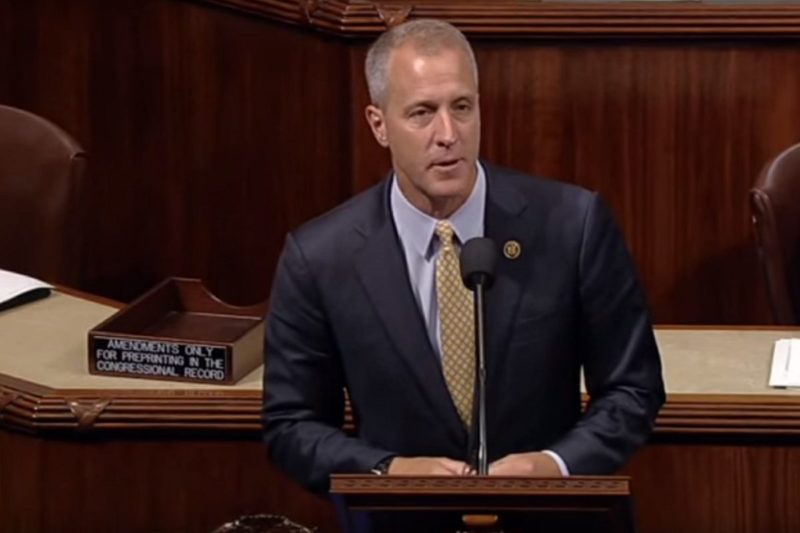Republicans Shamed on House Floor for Anti-LGBTQ Vote
The episode got uglier after the seven Republicans switched their “aye” votes to “noe” and pandemonium erupted on the House floor. Shouts of “Shame!” devolved into continuous booing as the amendment failed.

Democrats in the U.S. House of Representatives led chants of “Shame! Shame! Shame!” Thursday as GOP leaders undermined a vote to counter an anti-LGBTQ provision in the fiscal year 2017 defense authorization bill.
The House initially voted 217 to 206 in favor of an amendment to nullify language undoing President Obama’s LGBTQ anti-discrimination measures for federal contractors found in the National Defense Authorization Act (NDAA) (HR 4909), The Hill reported.
Rep. Sean Patrick Maloney (D-NY) moved to counter the NDAA provision during Thursday’s series of House votes on amendments to the Military Construction, Veterans Affairs and Related Agencies Appropriations Act of 2017 (HR 4974).
GOP leaders kept the vote open after the clock ran out and pressured seven Republicans to change their ballots without making the changes in full view of lawmakers at the front of the chamber, resulting in a 213-212 loss for the amendment, according to The Hill.
Twenty-nine Republicans ended up voting in favor of the Maloney amendment. The discriminatory language could be removed when a conference committee of House and Senate lawmakers convenes to reconcile the differences between their defense authorization bills.
Rep. Steve Russell (R-OK) authored the NDAA provision, which would hold federal contractors accountable to the Civil Rights Act of 1964 and the Americans with Disabilities Act of 1990. The protections and exemptions under these federal laws do not apply to LGBTQ people, undoing Obama’s 2014 executive order prohibiting federal contractors from discriminating based on sexual orientation or gender identity.
Obama didn’t bow to pressure from religious leaders to include broad religious exemptions.
“This is one of the ugliest episodes I’ve experienced in my three-plus years as a member of this House,” said Maloney, the amendment’s author, who is openly gay.
The episode got uglier after the seven Republicans switched their “aye” votes to “noe” and pandemonium erupted on the House floor. Shouts of “Shame!” devolved into continuous booing as the amendment failed.
House Minority Whip Steny Hoyer (D-MD) condemned the move in scathing terms after the failed vote.
“If we had done to the Republicans what was done to us, what was done to switch votes so that discrimination could prevail, there would be outrage expressed long into the night,” Hoyer said. Under that scenario, he said, Republicans would accuse Democrats of “undermining democracy, undermining this House, and making the House less than it should be.”
Hoyer took aim at House Speaker Paul Ryan (R-WI), who was not on the floor after the vote. The switch occurred “far beyond what Speaker Ryan has said ought to be the end of votes,” Hoyer said.
Ryan in a press conference denied any knowledge of the GOP’s floor maneuverings. “I don’t even know,” Ryan told reporters.
“This is federalism. The states should do this,” Ryan added. “The federal government shouldn’t stick its nose in this business.”
Back on the floor, Hoyer wouldn’t name the lawmakers who switched their votes.
“Seven people who had voted not to allow discrimination decided perhaps that principle was not as important as they thought just a minute or so before,” Hoyer said. “And they will have themselves to look at tonight in the mirror.”
Hoyer’s office later confirmed the names of the Republican lawmakers—Reps. Jeff Denham (CA), Darrell Issa (CA), Bruce Poliquin (ME), David Valadao (CA), Greg Walden (OR), Mimi Walters (CA) and David Young (IA)—to Rewire.
House Rules Committee Chair Pete Sessions (R-TX), who denied a vote the day before on Rep. Charlie Dent’s (R-PA) bipartisan amendment to strike the anti-LGBTQ provision, said the Republican floor action did not amount to discrimination.
“First of all, let me say this: I am a Republican. We do not discriminate,” Sessions said in a back-and-forth with Hoyer.
Hoyer denied accusing Republicans of discrimination.
“I will not, at this point in time, hazard an opinion on that fact,” he said.
